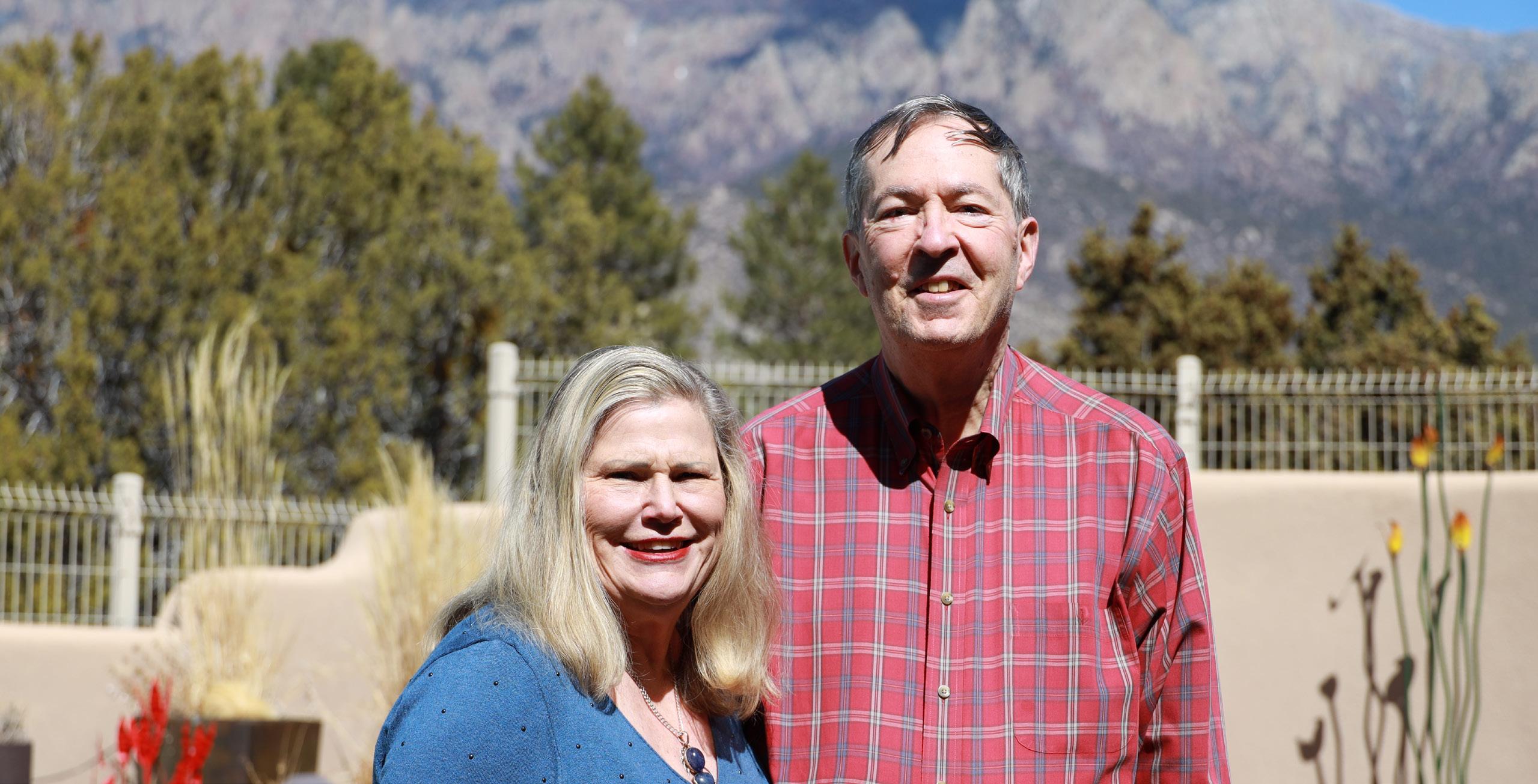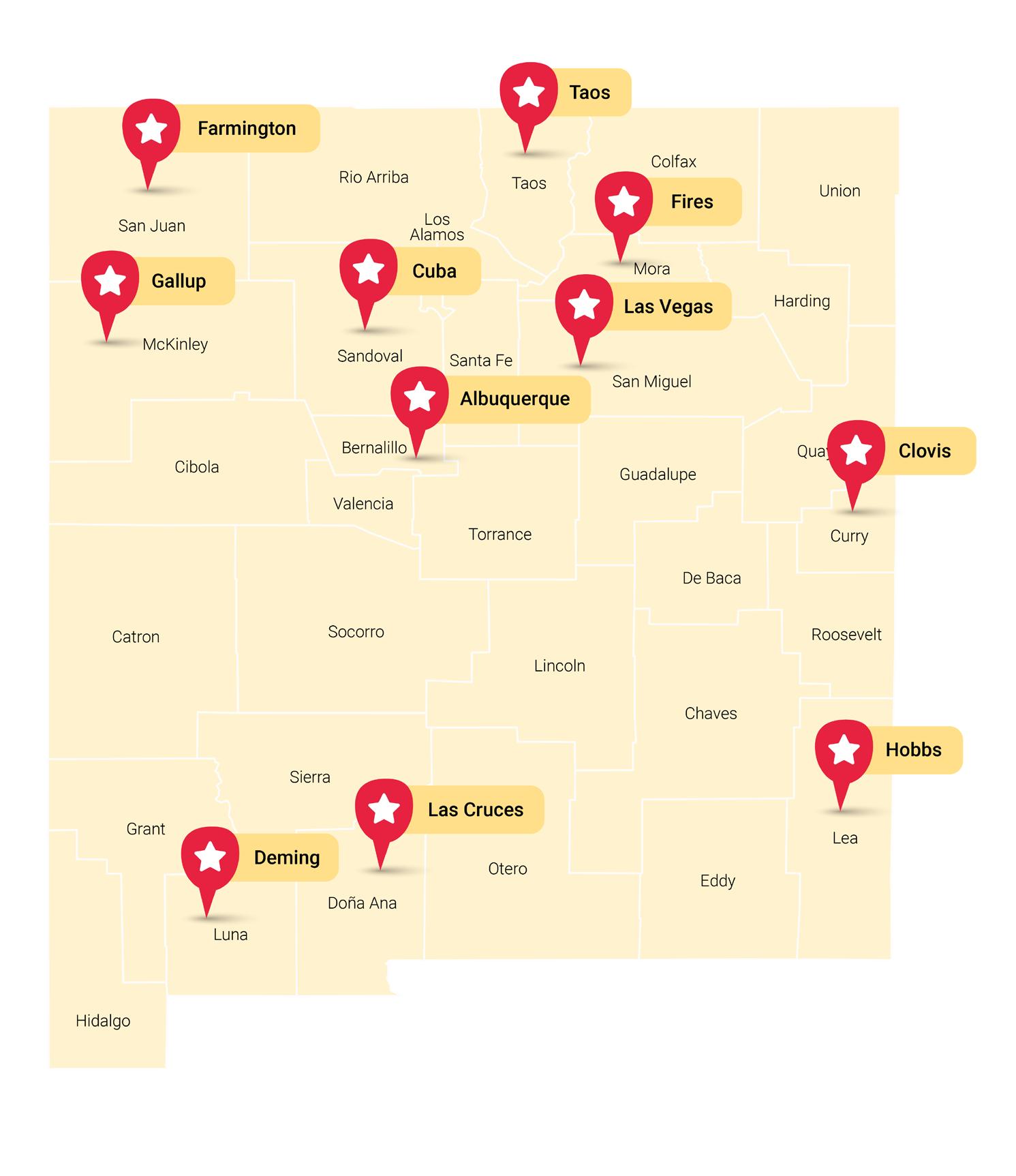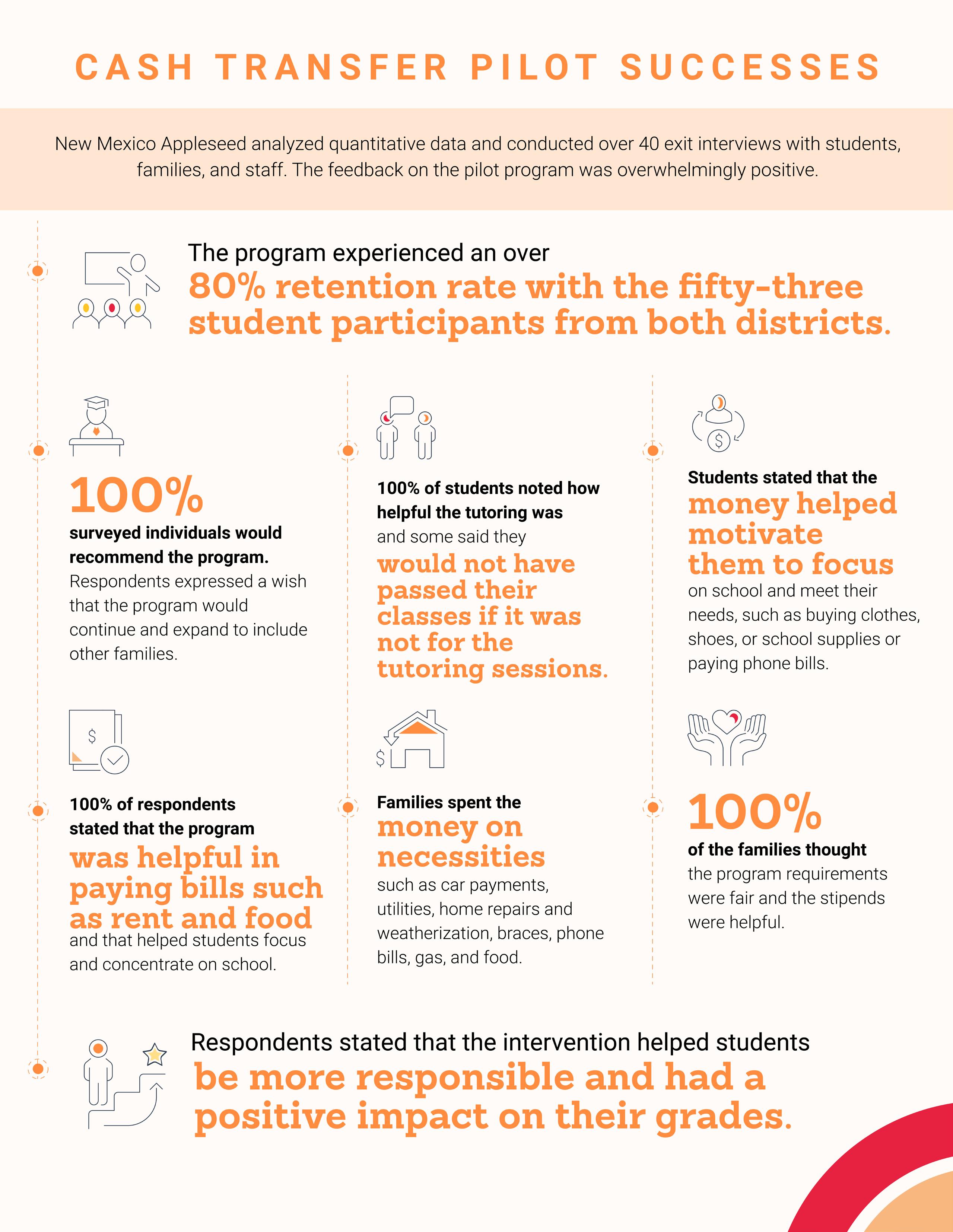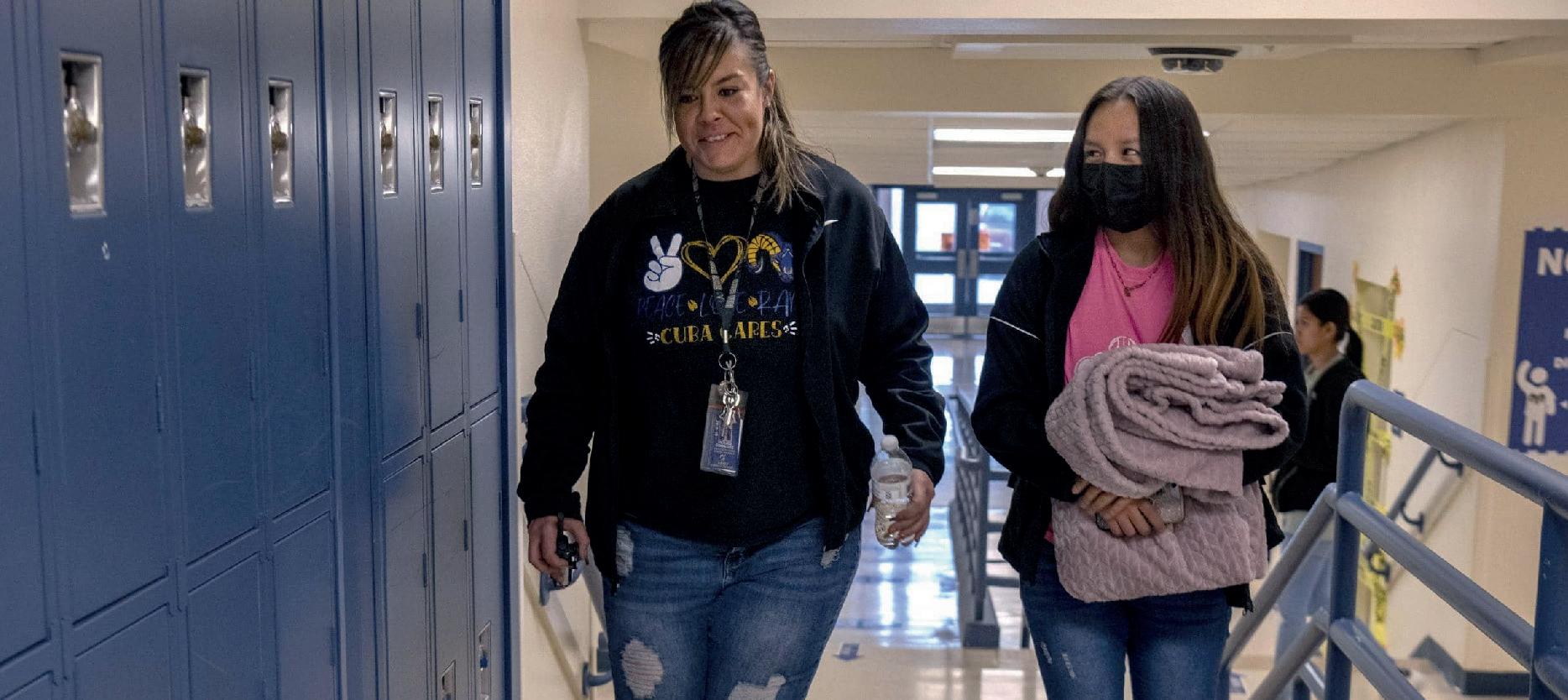2022 DONOR IMPACT REPORT






New Mexico Appleseed Donor Highlight
Work Ahead 2023
Executive Summary: How cash incentives lead to better performance in school for inadequately housed students
New Mexico Appleseed in the news: A balm for poverty
New Mexico Appleseed in the news: Give our homeless students cash? Pilot shows potential
Appleseed's team
2021-2022 Donors
New Mexico Appleseed's mission is to end poverty in New Mexico. We want to ensure that every child and family has the necessary support and opportunities to lift themselves out of poverty. We seek permanent and dramatic positive change.

Method
New Mexico Appleseed focuses on systemic solutions to the causes and consequences of poverty. We work from the tiniest communities to the state, tribal and federal government to define problems and create solutions. New Mexico Appleseed's work is thoughtful, innovative, and effective.
We thank you for taking the time to read this report, but most importantly, we thank you for your continued support and for believing, like we do, that poverty is not the result of bad choices, laziness, or lack of ambition. It is the result of poor policies. Together, we can fix that.
It’s been 14 years since I founded New Mexico Appleseed, and I have concluded with certainty that ending poverty in New Mexico is possible. The challenge isn’t as much figuring out how to fix it, as convincing people who have the power to fix it that it is a worthwhile and achievable goal.
At New Mexico Appleseed, we have learned that positive change at scale is only possible through disruptive, empathic, and smart system transformation. Our team works to understand system gaps and design solutions to bridge them, bringing families and individuals closer to the life-changing opportunities they deserve. Through this strategic work with deep partnerships in communities, the legislature, and academia, we have created a loop of research to policy with clear and obvious community and individual benefits. We have developed a mastery over this process to make high-impact systems change on behalf of children who could not possibly change the systems themselves.
This year alone, New Mexico Appleseed’s work has meant that tens of thousands of New Mexicans had more financial, housing, and/or nutritional support. None of these things would have happened without our presence, research, and effective advocacy. With your financial contribution we can continue making a permanent, dramatic difference in the lives of all New Mexicans. Perhaps more importantly, though, none of these things would have happened without your financial contributions.
Sincerely, Jennifer Ramo Executive Director
Cathy Allen
Kyle Armstrong
Anne Bingman
Joseph Goldberg, Founding Chair
Debbie Johnson
Don Kidd*
Gregory Levenson
Dale R. Dekker, Chair Dekker/Perich/Sabatini
Caroline Garcia, Treasurer KPMG LLP

Linh Nguyen, Secretary Lumina Fundation For Education, Inc
Kara Bobroff
One Generation
Sarah Brown Retired Dr. Veronica Garcia Retired
Randi McGinn McGinn, Montoya, Love & Curry
Dawn Nieto-Gouy Kiva Ventures
Georgie Ortiz CliftonLarsonAllen
Jennifer Ramo New Mexico Appleseed
Larry Lujan
Lisa McCulloch Tony Monfiletto Lillian Montoya Robin Otten
Bonnie Paisley Conchita Paz
Ann Rhoades
Ruth Schifani
Ernest Schmider John Ulrich
*Deceased

John Carey and Julie Bowdich generously funded our Southern New Mexico outreach coordinator position. We thank them for their belief in our work!
John and Julie were named 2022 Philanthropists of the Year by Albuquerque Business First, and are longtime community leaders and supporters of many nonprofit and community organizations. Julie has served as board chair of Presbyterian Healthcare Foundation and board member of the Albuquerque Community Foundation, Samaritan Counseling Center, New Mexico Museum of History, the Albuquerque Museum of Art and History, and the National Dance Institute (NDI). John was 2021-2022 board chair of United Way of Central New Mexico, 2007-2009 board chair of DreamSpring, and board member of Educate New Mexico, New Mexico Business Roundtable for Educational Excellence, the Tourism Association of New Mexico, and the New Mexico Finance Authority.

How is it that New Mexico spends billions of dollars on the symptoms of poverty and yet we see no significant changes to our children’s outcomes? A major reason is that we do not use data to identify who needs help, what kind of help they need, and whether any of that help is effective.
New Mexico Appleseed brought a solution to the state that may have the most impact of anything we have done yet: The Family Success Lab, which links data across agencies and families to paint a whole picture of risk factors, and protective factors and provides an opportunity for a real program evaluation.
The Family Success Lab at the New Mexico Department of Health: If the risk factor for failing third-grade reading is that your dad was in prison, we don’t know that. If a protective factor for staying out of child welfare is that you live with your grandmother, we don’t know that either. These are critical data stories and breadcrumbs that we must follow so that we can have positive outcomes for our families.
Prior to New Mexico Appleseed’s intervention, New Mexico state agencies had siloed data and services, so those data stories and breadcrumbs have been hidden until now. New Mexico Appleseed conceived, designed, and successfully advocated for the Family Success Lab at the New Mexico Department of Health. The impact of this is that the state didn’t know who got services, what services were offered and didn’t have an unduplicated count of individuals in multiple agencies, and wasn’t able to see the risk factors across generations.
The Family Success Lab at the Department of Health allows the state to do just that. As it grows, it will be a critical tool for the state and the legislature to know how best to deploy resources.
Partnering with state agency Secretaries to create a research agenda: New Mexico Appleseed is supporting the Early Childhood Education & Care Department (Early Childhood Department) and Department of Health (DOH) as they build on their data-sharing efforts and craft the Family Success Lab's research plan over the next few years.
The first order of business will likely be to create an unduplicated count of individuals across agencies and then create families and data across systems and generations.
Secured Funding for the Family Success Lab: In the 2022 legislative session, New Mexico Appleseed tirelessly advocated with legislators and drafted budget language to successfully secure $330,000 in recurring funding.
In the next year’s budget, the Early Childhood Department and the HSD have shared with us that they are directing millions of dollars toward the Family Success Lab.

New Mexico Appleseed uses our platform and relationships with state and national partners to bring nationally recognized expertise and thought leaders to New Mexico.
Harvard Kennedy School’s Government Performance Lab (GPL): New Mexico Appleseed presented to the GPL as an expert on our family economic stability work, as well as facilitated the successful application by Children Youth and Families Department (CYFD) and DOH with the GPL to join the first cohort of The Child & Family Wellbeing Accelerator. This accelerator will ''help advance reforms that keep families together by preventing crises before they occur.''
M.I.T.’s Abdul Latif Jameel Poverty Action Lab (J-PAL): J-PAL is a global research center in the Department of Economics at the Massachusetts Institute of Technology that works to reduce poverty by ensuring that policy is driven by evidence and research is translated into action. New Mexico Appleseed connected NMPED with J-PAL to receive a $50,000 technical assistance grant to evaluate how effective community schools were at meeting their student’s basic needs.
Chapin Hall at the University of Chicago: New Mexico Appleseed is partnering with experts at Chapin Hall on the W.K. Kellogg Foundation-funded “Basic Income for Baby Success” to help us design a cash transfer program for babies born with substance exposure. Our co-designers are women with lived experience having babies with substance exposure and are now peer support workers and activists in their communities.
UNM Health Sciences Center Office for Community Health (OCH) in the Department of Family and Community Medicine: New Mexico Appleseed is partnering with faculty and staff at OCH to design, implement and evaluate the W.K. Kellogg-funded “Family Centered Benefits Enrollment Pilot,” where families in a mix of urban and rural sites will receive referrals and support to enroll in public benefits. New Mexico Appleseed is bringing our legal and policy skills and our system change lens to the pilot to understand how best to enroll families in benefits and identify areas to improve the implementation of public benefits programs.
University of New Mexico Prevention Research Center: New Mexico Appleseed is bringing together the Prevention Research Center with the Family Success Lab to support their work moving the research agenda for this state forward.
UNM Evaluation Lab: Faculty at the University of New Mexico approached New Mexico Appleseed to work with CYFD and the Family Success Lab to evaluate the outcomes of at-risk families receiving services from a community-based services organization.
For many years New Mexico has been at or near the highest in food insecurity. With over a quarter of children living in poverty a daily activity for many includes wondering where their next meal is coming from. The combination of inadequate nutrition and toxic stress is a recipe for trauma.
New Mexico Appleseed works with individuals and communities all the way up to the federal government to make change. Our work feeds tens of thousands of children every year in New Mexico and has been replicated nationally.
This is just a snapshot of our work.
Tribal Nutrition Improvement Act: For six years, New Mexico Appleseed has been working on the Tribal Nutrition Improvement Act (TNIA), to reduce hunger among tribal children, allow tribes to serve culturally appropriate school foods, and permit tribes to operate their own school feeding programs. In July 2022, Representative Teresa Leger Fernandez and Senator Martin Heinrich introduced the Tribal Nutrition Improvement Act, which will accomplish these goals.
Summer Meals: New Mexico Appleseed helped advocate federally for the Keep Kids Fed Act to help provide and extend much-needed waivers that provided free summer meals for summer 2022. New Mexico Appleseed worked with all school districts to inform them of this legislative win and helped provide guidance on how to provide meals to all students. Because this legislative win came after summer started, New Mexico Appleseed worked with school districts and nonprofits to make the
switch midsummer and creatively use waivers to cover the summer meal expenses.
Lunch Shaming: New Mexico Appleseed’s wildly successful and truly disruptive law prohibiting what was called “lunch shaming” meant that every child in New Mexico got a complete meal regardless of how much their parents owed the cafeteria or how much money they had in their pocket. Not only did dozens of states replicate this law, but thanks to New Mexico Appleseed’s advocacy a federal bill has been introduced and is part of the Child Nutrition Reauthorization Act.
Obtained disaster funds for 27,000 New Mexican fire victims: After the 2022 fires, New Mexico Appleseed moved quickly to alert the state to a USDA program that provided 27,000 people in northern New Mexico with SNAP (Supplemental Nutrition Assistance Program) benefits ensuring that they had adequate food while they were evacuated and homeless. Without New Mexico Appleseed’s intervention, the state would not have applied for this program that had not been used in over 20 years.
Designed and Spearheaded Statewide Weekend and Holiday Feeding Plan: New Mexico Appleseed spearheaded a state-wide hunger task force around weekend feeding and holiday feeding for the Governor’s office, Public Education Department (PED), and the Early Childhood Education & Care Department (Early Childhood Department).
Partnered with Governor's Office to Pass a $24.1 Million Food, Farm, and Hunger Package: New Mexico Appleseed worked closely with the Governor’s office and the Food, Farm, and Hunger coalition to improve the food supply chain and support for small farms and ranches, all while making healthy food available to more people. This bill also increased money for new programs starting the Child and Adult Care Food Program (CACFP) and weekend feeding by providing money for equipment and transportation.
Universal Free Meals Program Advocacy for 3.78 million meals daily: New Mexico Appleseed has been working with the Governor’s Office and PED in bringing universal meals to all New Mexico students. New Mexico Appleseed is working with PED in applying for New Mexico to participate in a USDA pilot program at the start of the 2023-24 school year to provide free meals to all students.
Free Meals for 100% of students (36,000) in Las Cruces and Gallup: New Mexico Appleseed worked with Las Cruces Public schools and Gallup for years to ensure they can provide meals to all their students using the Community Eligibility Provision (CEP).
As people lost their jobs during the pandemic, eligibility changed for these school districts. New Mexico Appleseed encouraged them to rerun their numbers and they were finally eligible for the 2022 school year to provide free meals to all their students.
Ensuring Meals Free by Eliminating Reduced Price Meal Fees: In 2020, New Mexico Appleseed wrote the legislation to provide funding to waive the copays for the approximately 57,000 students who qualify for reduced-price meals. Now that school meals are no longer free as they were
during COVID, our legislation means children from all families earning less than 185% of the federal poverty level will still eat for free.
Breakfast After the Bell: New Mexico Appleseed was the first in the nation to legislatively mandate Breakfast After the Bell for low-income elementary schools. This required eligible schools to set aside time for schools to have children eat breakfast after the bell rang. This program rapidly expanded breakfast to low-income children at the beginning of the day, ensuring if they were late or missed breakfast at home, they would still receive breakfast.
In 2020, New Mexico Appleseed expanded in regulation this mandate to middle and high schools. Many schools are not in compliance and New Mexico Appleseed is working with the Public Education Department and the Governor's office to help those school districts.

What's the opposite of poverty? It is enough. It is enough money to pay for your home and utilities, have safe and reliable transportation, and to buy food, clothes and toiletries.
New Mexico Appleseed studies global development initiatives and, when appropriate, brings them to New Mexico. The provision of cash to families without sufficient access to money to pay for basic needs is called a “cash transfer.” New Mexico did the first in the state cash transfers during COVID-19 with spectacular results.
Paying inadequately housed students to go to school pilot (Page 14): New Mexico Appleseed partnered with two rural school districts in Northern New Mexico to support 53 students during the 2020-2021 school year with tutoring, social-emotional support, and $500 a month. Students and families reported greater engagement with school in part due to the tutoring and shared how helpful the cash transfer was to meet their basic needs such as rent, clothes, and medical bills.
Transfer Design: Some of the most at-risk groups in New Mexico are parents with babies who are born with drug exposure. Funded by the W.K Kellogg Foundation, New Mexico Appleseed is working with women with lived experience who had babies or grandchildren born drug exposed. We are partnering with these women experts to design a cash transfer pilot that would support and stabilize the families.
Access to Benefits: New Mexico Appleseed, in partnership with the Health Sciences Center at UNM, provides policy support to their Family Centered Benefits Enrollment Pilot that screens people for benefits and helps them sign up with support.
Appleseed is hard at work on this pilot; preparing benefits screeners, coordinating and preparing training for the Office of Community Health (OCH) staff, and identifying key policy issues that will impact the pilot launch and roll-out. This is also a W.K. Kellogg foundation-funded project. (Page 6)
In 2012, New Mexico Appleseed identified homelessness as a hidden issue among New Mexico children. Everywhere we looked, we witnessed children without utilities, sleeping in cars, overcrowded in their homes, and couch surfing. Their inadequate housing was not documented, but their outcomes were all the same. They are highly mobile, move from school to school, are most likely to not graduate, and as they get older are often disconnected from school, work, and much needed services.
To address this issue in a methodical manner, we created a theory of change that involves the identification of more students, an understanding of what kind of inadequate housing they have, and tailoring policy solutions to address those different types of housing issues.
Policy Leadership: New Mexico Appleseed staff serves as Vice Chair for the statewide Education for Homeless Children and Youth Education Committee. The committee has statewide representation from schools, community organizations, and state agencies. Current work includes working with PED to issue guidance clarifying options schools have for transporting students (a huge issue for students experiencing homelessness), pushing for the use of a universal housing screener with school districts, as well as advocating to expand our previous cash transfer pilots.
Students: New Mexico Appleseed, in partnership with PED, has spent the last year and a half developing a universal housing screener to ascertain whether families are experiencing homelessness, housing instability, or

housing inadequacy. The screener has been shared with school districts, charter schools, and community organizations statewide and nationally.
Districts and charter schools have been piloting the screener for the 2022-2023 school year. New Mexico Appleseed is advocating for statewide use of the screener each school year to ensure that unstably housed students receive the support they need and inform state funding and policy decisions.
Outreach Mini-Grants with Technical Assistance Support: For the 2022-2023 school year, New Mexico Appleseed is providing targeted outreach, technical assistance, and grant funding from our own donor dollars to charter schools with at-risk populations that had not previously identified any inadequately housed students. Schools received one-on-one support including training and materials and attended a monthly community of practice with other grantees led by New Mexico Appleseed to learn and develop a statewide network of colleagues. The goal is for the schools to identify inadequately housed students and connect them with the services they need. New Mexico Appleseed supports the schools in this goal and also learns by listening to the schools to identify areas for systems-level change.
Statewide Community of Practices: New Mexico Appleseed holds monthly statewide Community of Practice events for all school districts and charters, with 30-50+ participants around the state participating in any given event. Sessions focus on providing up-to-date information and technical assistance to designated homelessness liaisons and creating a space where liaisons can provide support and share resources with one another. Topics covered include delving into
inadequate housing, the rights and experiences of unaccompanied youth, which featured youth speakers sharing their expertise and experience, how to help families access rental assistance programs around the state, and guardianship issues for children and youth.
Experiencing Homelessness: An area that is a frequent struggle for youth experiencing homelessness is being able to access IDs if they are listed as an 'unaccompanied youth': a youth not currently living with a parent or guardian. While unaccompanied youth do not need a parent's signature nor the two proofs of residency to obtain an ID, the forms and process are confusing and hard to find.
With input from both the New Mexico PED and the Motor Vehicle Division at the Taxation and Revenue Department, New Mexico Appleseed put together a handout entitled “Accessing IDs for Unaccompanied Youth” to provide step-by-step instructions and links to the necessary documents. This document has been shared statewide and will make it easier for youth to access the IDs they need to get a job, obtain housing, and other critical services.
New Mexico Appleseed is also working on legislation for the 2023 session to waive fees for IDs for youth and adults experiencing homelessness.
New Mexico Appleseed partnered with PED and national advocate SchoolHouse Connections to organize and lead a 3-day statewide conference for all districts and charters across the state. New Mexico Appleseed led sessions on state policies and cross-systems partnerships.
New Mexico Appleseed regularly provides technical assistance and support to schools and districts with legal and policy issues such as clarifying their McKinney-Vento obligations, helping make sure McKinney-Vento students are identified when they transfer districts, and connecting schools with concrete resources to meet the needs of their students.
Education
Office: New Mexico Appleseed works closely with PED staff to ensure federal homelessness in education laws are implemented and identify areas where extra funding, support, and policy changes are needed. As needed, New Mexico Appleseed also has engaged with the Governor's office regarding best practices and what appropriations might be helpful.
In 2021, New Mexico Appleseed secured funding to expand our work to cover more rural areas of southern New Mexico. In 2022, we hired our first Rural Outreach Coordinator, Steven Montaño, to serve the Las Cruces area. In his first assignments, he assisted Family Youth Inc. in expanding their Summer Meals program, provided support to Las Cruces Public schools in adopting the Community Eligibility Provision (CEP), partnered with Gadsden Public Schools to help with Breakfast After the Bell program, and Helped Early Childhood Department in distributing Summer Meal funds to rural schools. Through his outreach to rural communities, he has been attending a minimum of four regional events per week, conducting outreach with service providers, New Mexico Appleseed partners, and almost 6,000 students, school staff, and families.

Farmington School District: Gave permanent access to free daily Breakfast After the Bell for nearly 1500 middle and high school students.
Clovis School District: Provided legal and policy technical assistance to school district legal policy support to their homeless students.

Hobbs School District: New Mexico Appleseed’s housing screener is now used to identify more students who need support.
Cuba / West Las Vegas / Albuquerque / Las Cruces School Districts: Paid a $500 monthly stipend to inadequately housed students to attend school and weekly tutoring.
Calf Canyon / Hermit’s Peak Fire Victims: Enabled approximately 27,000 Northern New Mexico fire victims to receive federal nutrition support called Disaster SNAP.
Gallup / Taos Charter Schools: Gave $2000 minigrants to charter schools to help them identify more inadequately housed students so they could serve them better.
Deming School District: Working with the Deming school district to provide year-round USDA feeding and increase identification and support of inadequately housed students.
• Free School Meals for All Children: New Mexico Appleseed is working on federal and state levels to ensure that all New Mexico children get at least two free meals at school each day.
• Basic Needs Stipend for School Engagement: New Mexico Appleseed is preparing legislation to expand its successful pilot that essentially paid inadequately housed students $500 a month to go to school, do their homework, attend tutoring, and engage in social-emotional support programming. The expansion would extend to 1,400 high school students and provide year-round financial and other types of support.
• Legislative waiver for identification fees for inadequately housed students: New Mexico Appleseed is working on legislation for the 2023 session to waive fees for IDs for youth and adults experiencing homelessness.
• Screen All School-Aged Children for Housing Adequacy: New Mexico Appleseed continues to push universal screening for housing status and is partnering with PED to have more students screened and working with school districts to do this at a local level.
• Guaranteed income and support for caregivers of babies born with substance exposure: New Mexico Appleseed is codesigning a guaranteed income pilot for the families of babies born with substance use exposure during pregnancy. The design team is comprised of an equal mix of issue area experts and individuals with lived expertise that are driving the process. The final work product will be a turnkey guaranteed income program to support family preservation and reunification and help families meet the needs of their babies.
• Public benefits policy pilot with UNM HSC Office of Community Health: New Mexico Appleseed is partnering with the Office of Community Health at UNM to expand access to public benefits at five sites around the state. New Mexico Appleseed will help identify barriers to enrollment and uptake, as well as areas where benefits programs such as WIC and SNAP can be improved. New Mexico Appleseed will also be supporting HSD and UNM with the Medicaid recertification process – in which hundreds of thousands of Medicaid recipients will have to show they are still eligible for Medicaid after an almost three-year pause on eligibility redeterminations because of the public health emergency.
• Creating a New Mexico Social Services Research Agenda: New Mexico Appleseed is working with state agencies to create a cross-system research agenda to see correlations and causations of risk factors and protective factors. Looking at a whole family through their administrative data footprints will enable New Mexico to make policy decisions about who needs services, what services they need, and evaluate those services to make sure they are effective.
Homelessness: A Conditional Cash Transfer Pilot
Having inadequate housing has been repeatedly correlated in research with detrimental effects on a child’s ability to meet their full potential while attending school.1 Furthermore, not completing high school is the single biggest risk factor for a young person experiencing homelessness.2
The corollary is also borne out in data. There is ample research showing that when families are able to meet their basic needs such as food, housing, and medical care, parents and caregivers in turn experience less stress, and are better prepared to provide their children the support required for them to grow into healthy, productive adults.3
The following questions motivated the design and implementation of the "Students Experiencing Homelessness: A Conditional Cash Transfer Pilot” (CCT pilot) in Cuba and West Las Vegas, New Mexico during the 2020-2021 school year:

• Can monetary incentives to inadequately housed students increase engagement in school, tutoring and emotional support offerings?
• Does that engagement improve their short-term academic outcomes and socialemotional wellbeing?
• How do you design a pilot and evaluation tools focused on traditionally marginalized, traumatized and rural populations?
• Is it ethical to attach a condition to receive money in the context where the recipients lack the resources to meet their basic needs?
New Mexico Youth Risk and Resiliency Survey, (September 16, 2019) 2015 NM-YRRS Results: Housing Instability Among Youth. Institute for Children, Poverty and Homelessness (December 18, 2019), Disparities in Academic Achievement, https://www.icphusa.org/reports/disparities-in-academic-achievement/.
2 Hall and Voices of Youth Count, Research to Impact Brief, Missed Opportunities: Education Among Youth Experiencing Homelessness in American (November 2019), https://voicesofyouthcount.org/brief/missed-opportunities-education-among-youth-experiencing-homelessness-inamerica/.
3 Carrie Masten, Joan Lombardi, And Philip Fisher, Center on Budget and Policy Priorities, Helping Families Meet Basic Needs Enables Parents to Promote Children’s Healthy Grown, Development (October 28, 2021), https://Www.Cbpp.Org/Research/Poverty-And-Inequality/HelpingFamilies-Meet-Basic-Needs-Enables-Parents-To-Promote. Sam Waxman, Arloc Sherman, and Kris Cox, Center on Budget and Policy Priorities, Income Support Associated with Improved Health Outcomes for Children, Many Studies Show (May 27, 2021), https://www.cbpp.org/ research/federal-tax/income-support-associated-with-improved-health-outcomes-for-children-many.
4 New Mexico Legislative Finance Committee, Spotlight: Status of School Reopening and Remote Education in Fall 2020 (October 28, 2020), https://www.nmlegis.gov/Handouts/ALFC%20 102820%20Item%203%20Spotlight%20- %20Status%20of%20School%20Reopening%20and%20Remote%20Education%20in%20Fall%202020....pdf.
In partnership with the LANL Foundation (LANLF), Cuba Independent School District (CISD), and West Las Vegas School District (WLVSD), New Mexico Appleseed designed, implemented and evaluated this intervention to provide educational and financial support to inadequately housed students. In light of the challenges even stably housed students faced during the 2020-2021 remote school year due to COVID19, the barriers unstably housed students experienced to academic success and social-emotional wellbeing were likely even greater.4
Participating students were inadequately housed high school students living in or around Cuba and West Las Vegas, New Mexico. Both communities are tight-knit with strong cultural supports and family connections, despite generations of poverty and racial discrimination. The communities’ assets include engaged and supportive school districts that value their students. There are also challenges, almost all of which have been the result of generational racism and resulting trauma.
The CISD students are largely Native American and live in small and extremely rural communities, many of which have limited access to electricity, plumbing, or internet. WLVSD is made up of largely Hispanic students. While there is also extreme poverty in this district, students were more likely to have internet access and the community is not as rural as Cuba. Both communities struggle with lack of access to services, underfunding for education and mental health, and have few jobs that pay a living wage.
Participants received a basic needs stipend of $500 for each month, up to eight months during the 20202021 school year in exchange for the completion of the following requirements:
• Weekly 1–2-hour tutoring sessions designed to assist students with completing work and instruction in reading and math.
• Weekly check-ins to address social-emotional issues, academic challenges, and basic needs of students through-out the school year. These check-ins were a mix of online, over the phone and in-person, including home visits.
• Attend school 90% of the time.
• Complete 90% of their schoolwork on.
The CCT pilot was designed to support the real-time academic, social-emotional and financial needs of inadequately housed students during the COVID-19 pandemic, while adding to the larger conversation about using cash transfers to address those same needs. In response to the real-time participant needs and barriers to participation outside of the participants’ control, New Mexico Appleseed created a “Compassionate Exception” so that students were able to receive the cash transfer even when all requirements were not met. Both school districts’ staff made extra efforts to find and support their students, at times driving at least forty-five minutes to meet students in their homes, gathering additional resources such as food and clothing, and when students disengaged, doing everything they could to reconnect and reengage them. School staff and parents alike saw internet access as a barrier to meeting the conditions.
The CCT pilot was an observational study that involved the design process, the intervention and the evaluation. There was no control or comparison group because the nature of the locations and the context of COVID-19 were so unusual. Though the target communities and the reality of the pandemic were unique, the CCT pilot findings reveal positive outcomes for participants and generated sufficient evidence to merit further study

PUBLISHED: SATURDAY, OCTOBER 29TH, 2022 AT 9:42PM
UPDATED: SUNDAY, OCTOBER 30TH, 2022 AT 12:02AM
Shilayia Antonio, 16, looks at her phone with her friend, Shanaeya Thomas, left, in the media area of Cuba High School on Thursday. Antonio, a student who in the 2020-21 school year was experiencing housing instability, was among 53 students who participated in a pilot program giving conditional money for basic needs. (Eddie Moore/Albuquerque Journal)
Copyright © 2022 Albuquerque Journal

Mya Meredith, a junior at Cuba High School, had a harder freshman year than most. For some time that year, she lived in a domestic violence shelter with her family, and there were times they had trouble paying bills and getting basic necessities like clothes and hygiene products.
“We were struggling for a while and we were just kind of stuck,” she said. “With school, I was really falling behind.” They’d soon find out they weren’t alone in their challenges. Meredith participated in a pilot program giving $500 every month to 53 high school students who were homeless or experiencing some form of housing insecurity. The program was run by New Mexico Appleseed, a foundation dedicated to tackling poverty in the state.
The pilot was funded by the Los Alamos National Laboratory Foundation which, according to an Appleseed report about the program, gave about $120,000 each to Cuba Independent School District and West Las Vegas School District to cover tutoring, family stipends and costs for district staff.

Community Schools and Cuba CARES Director Victoria Dominguez, left, walks down the hallways of Cuba High School with junior Shilayia Antonio on Thursday. Antonio was among several Cuba students to receive monthly stipends to help with basic needs during the 2020-21 school year. (Eddie Moore/Albuquerque Journal) “We really wanted to target those populations that we felt were suffering the most during the pandemic,” LANL Foundation President and CEO Jenny Parks said.

Through the program, which ran about eight months in the 2020-21 school year, Meredith said she and her family were able to pay for their basic needs, which helped lift a burden from her and her mother.
Meredith has since left the shelter and now lives in the Ojo Encino chapter of the Navajo Nation. On top of the help she received to buy basic necessities, the program also helped her catch up in school.
That, in turn, had an ongoing positive effect, helping her academically in the years since the program ended.
“I really caught up with my math, because that was one of the subjects that I was really struggling in,” she said. “It just helped me catch up a lot.”

The program attached several conditions to the cash. Those included requiring students to attend school 90% of the time and complete the same percentage of their class work, and requiring them to meet every week for check-ins and tutoring sessions.
Appleseed Founder Jenny Ramo said she and her team agonized over the ethics of holding students and their families to those conditions. “The ethics really weighed heavily on me, because people deserve to have their basic needs met, no matter what, period. They deserve housing, food, access to health care,” she said. “And so to add a condition to getting your basic needs met is problematic.
At the end of the day, she said students seemed to benefit from going to school, tutoring and emotional support, and having the money tied to participation in those things was the “least problematic” solution. Students and their families all figured the conditions were fair as well.

Shilayia Antonio, another junior at Cuba High School, said she and her older sister both saw their grades soar back from failing as a result of their tutoring sessions – a recovery she said has stood the test of time, even after the program ended.
“It was a really big help,” she said. And that was just the cherry on top of the cake of being able to pay for school supplies, clothes, utilities, rent and car payments with the monthly checks.
Continued support
The pilot brought a lot of good to students and their families.
According to a report about the program by Appleseed, all but one of the participating seniors graduated on time that year – though the foundation noted that outcome could not be attributed to the pilot alone.
They did say that students almost universally saw their grades improve by the end of the program and benefited from peace of mind from having their basic needs better taken care of.
But for all the good that the pilot program brought, it only ran during that one school year, and school staff, students and families just about universally said they wished it would have continued.
“I really think that it was a working program, because it allowed the kids to not have to worry about adult situations,” West Las Vegas School District Superintendent Christopher Gutierrez said. “This program gave them a glimpse of light at the end of the tunnel to where they could be kids and focus on them and what they need to do to maybe, eventually, get out there and be their own adults someday.”
Cuba High School, home to just shy of 300 students, serves largely rural communities. Most students who attend Cuba Independent School District schools are Indigenous, the district superintendent says. (Eddie Moore/Albuquerque Journal)

And while students and their families were helped by the program, that doesn’t mean their struggles ended with the pilot.
School staff, including teachers, are still working with many of the students originally involved in the pilot –some of whom are still considered “at risk” and are experiencing housing instability.

“After this program, honestly, they don’t have the money, right?” Cuba High School math teacher Mary Ann Ga said. “After the program, they don’t have a house to live (in), and it breaks my heart.
“I hope this program will be continuous so that we can house the students and help them to survive.”
Both Ramo and Parks agree. Still, on top of the fact that Parks said the program was “expensive” and couldn’t be continued, both pointed out that it was originally intended as a pilot.
Nevertheless, Ramo said Appleseed found that the pilot was able to show that providing conditional cash to students in need did help their academic outcomes.
“In general, people are not blowing it on things that don’t matter. They’re not blowing it on drugs, they’re not blowing it on alcohol,” Ramo said. “They really do just become better parents and better kids and less stressed when they have their basic needs met.”
Ramo said she plans to make an appeal to New Mexico lawmakers in the coming years to implement and fund similar programs at a statewide level.
“We are hoping the Legislature steps in, maybe for next year, and really puts aside money for cash transfers,” she said. “We would recommend the homeless population, inadequately housed population, because they are the most vulnerable of the vulnerable, and they’re the most likely to succeed with financial help.
IN THE PRESS

PUBLISHED: WEDNESDAY, NOVEMBER 2ND, 2022 AT 12:02AM
UPDATED: WEDNESDAY, NOVEMBER 2ND, 2022 AT 12:15AM
It probably comes as no surprise that reducing the stress of living in poverty, providing tutoring and addressing social-emotional challenges can help atrisk high school students succeed in the classroom.
Still, it’s instructive to see the outcomes from testing the hypothesis: Can monetary incentives to inadequately housed students — with reasonable, goal-oriented strings attached — change the trajectory of their academic lives? It’s an important question in New Mexico, given the number of people who depend on government assistance to get by.
We now have some sense of the potential of providing financial assistance to high school students who are homeless or experiencing some form of housing insecurity, thanks to a pilot program designed and run by New Mexico Appleseed and funded by Los Alamos National Laboratory Foundation, which has a permanent endowment to support public schools in the seven-county region surrounding the lab.
The foundation gave about $120,000 each to the Cuba Independent School District and the West Las Vegas School District to cover tutoring, family stipends and costs for district staff.
“We really wanted to target those populations that we felt were suffering the most during the pandemic,” LANL Foundation President and CEO Jenny Parks says.
For eight months during the 2020-21 school year, the pilot program provided $500 every month to 53 qualifying high school students. The results are promising.
Appleseed’s report on the project concludes that the monetary incentives to the targeted students in the pilot program increased engagement in school, tutoring and emotional support offerings.
“When students are unable to meet their basic needs on a regular basis, it can be next to impossible to
make school a priority,” the report states. “Offering families, or the students, a monthly stipend in exchange for their students’ participation in school is a way to reward their continued participation while allowing the students to better meet their basic needs.”
There was considerable consternation about attaching conditions to the cash. Appleseed consulted with an ethicist before including requirements for students to attend school 90% of the time and complete 90% of their class work. Students also had to meet every week for check-in and tutoring sessions. All are weighted to helping students succeed academically.
And while Appleseed Founder Jenny Ramo says the requirements “really weighed heavily on me, because people deserve to have their basic needs met, no matter what, period,” the conditions had no negative effects. Fully 100% of the families thought the program requirements were fair and the stipends helpful. Students almost universally saw their grades improve by the end of the program and benefited from peace of mind from having their basic needs better taken care of.
“I really think that it was a working program, because it allowed the kids to not have to worry about adult situations,” West Las Vegas School District Superintendent Christopher Gutierrez says. “This program gave them a glimpse of light at the end of the tunnel to where they could be kids and focus on them and what they need to do to maybe, eventually, get out there and be their own adults someday.”
Ramo says the pilot was able to show that providing conditional cash to students in need did help their academic outcomes, something she hopes could spur lawmakers to consider replicating the pilot statewide.
“We are hoping the Legislature steps in, maybe for next year, and really puts aside money for cash transfers,” she says. “We would recommend the homeless population, inadequately housed population, because they are the most vulnerable of the vulnerable, and they’re the most likely to succeed with financial help.”
With safeguards in place, it could be money very well spent. Lawmakers should fully vet expanding the program.

Jennifer Ramo, Executive Director jramo@nmappleseed.org
Jennifer Ramo is the founder and Executive Director of New Mexico Appleseed. An experienced attorney, she designed New Mexico Appleseed’s effective system of change and created Appleseed’s first-in-the-nation programs such as the Hunger-Free Students’ Bill of Rights (prohibited lunch shaming children whose parents owe school meal debt), the Breakfast After the Bell law (requires all high poverty elementary schools to serve breakfast during the school day that has been replicated by over a dozen states and districts) and the Food Access Navigator project on the Navajo Nation (awarded a USDA innovation demonstration grant). Her anti-hunger and homelessness work has received international attention and been highlighted in the New York Times, CNN, USA Today, Le Monde, BBC and Al Jazeera, among others.
Ms. Ramo’s professional focus is on multi-generational systems involvement and using community voice/ qualitative data and quantitative data to improve poverty outcomes. The lens of racial equity in the poverty arena is a natural extension of this work. Ms. Ramo is a graduate of Albuquerque Academy, the University of Southern California and Tulane Law School. She was a recipient of the Coro Fellowship.
Meghan Mead, Director of Law and Policy mmead@nmappleseed.org
Meghan Mead provides policy and legal expertise across all of Appleseed’s issue areas. She helps identify effective solutions to problems affecting child poverty, and advocates with local, state and federal partners for their implementation. Her work includes successful legislative advocacy to eliminate the reduced-price copays for school meals, securing funding for the Family Success Lab at the Department of Health, and providing technical support
to state and local partners on issues around child homelessness, including improving identification.
Prior to her work at New Mexico Appleseed, Ms. Mead was a practicing attorney for ten years, primarily focusing on health care and nonprofit tax and governance. She is a graduate of Stanford Law School and received her undergraduate degree magna cum laude in history and economics from Mount Holyoke College.
Daniel Valverde, Director of Strategy dvalverde@nmappleseed.org
Daniel Valverde is responsible for bringing awareness about child hunger issues across the state and helps support federal programs, such as school breakfast, school lunch, and after school meals. He helps assist after school programs in receiving free reimbursable meals and snacks using federal funds. He also works on Appleseed’s McKinney-Vento program. His work includes supporting school districts around the state with their McKinney-Vento programs, offering technical assistance, and identifying issues on the ground that require policy changes. Mr. Valverde received his bachelor's degree in anthropology at Eastern New Mexico University, and his master's degree in cultural anthropology and food studies at New Mexico State University.
Rosalie Nava, Director of Research, Equity and Community Empowerment rnava@nmappleseed.org
With a background in public health and social work, Rosalie Nava brings expertise in equity issues and program management. She helped develop trainings and educational material for school districts prior to and during the COVID-19 pandemic. Ms. Nava received master’s degrees in social work and public health from New Mexico State University. She served in the United States Peace
Corps as a community educator and micro-business developer in the South Pacific, Kingdom of Tonga from 2006-2008.
Karen Burbank, Director of Administration kburbank@nmappleseed.org
Karen Burbank has comprehensive administrative, bookkeeping, and office management experience. She also has extensive experience with event coordination, inventory and controls, fundraising, and publications. Ms. Burbank has worked for both for-profit and nonprofits, is known for her attention to every detail, and brings outstanding operations assurance and accurate and timely accounting and reporting administration. She holds multiple degrees from the University of Massachusetts at Amherst, graduating cum laude with both a Bachelor’s in Japanese language and, through Amherst College, a Bachelor’s in Art History.
Steven Montaño, Rural Outreach Coordinator smontano@nmappleseed.org
Steven served his country honorably during Operation Desert Storm. He was awarded numerous combat citations for courage and gallantry in combat while serving in the US Army with the First Armor Division “Old Ironsides”. Steven is also a Life Member of the Veterans of Foreign Wars (VFW).
Steven is retired from the State of New Mexico as the Senior Business Development Consultant and was responsible for Economic Development activities for Southern New Mexico. While serving in this role, he was able to bring in many new businesses and high paying jobs to the State of New Mexico. He has been involved in all facets of business and finance operations at the Federal and State levels, with strong emphasis on business recruitment and expansion operations. In his past years as a public servant, he has received numerous awards, certifications, and other recognition for outstanding contributions in Economic Development
and Public Service. He held the distinct honor of serving under four Governors (Gov. King, Johnson, Richardson and Martinez).
After his State of New Mexico career, he served with the US Department of Commerce and the US Department of Treasury, working with Economic and Business Development in the Western United States.
Samantha Adams
Hussam Albanna
Garrett and Emily Allen Victoria Anaya
Derek Anderson
Anonymous (9)
Robert and Sara Armstrong
Jan Avent and Dave Rossetti
Paige Leslie Baird and David Baird Michael Behm
Ellen and Paul Biderman Jeff and Anne Bingaman
Alan and Bronnie Blaugrund Cliff and Nancy Blaugrund
Bryan Bobrick Kara Bobroff
Sarah and Doug Brown Bill Broyles
Daniel Burton and Caroline Little Neil Canavan
John Carey and Julia Bowdich
Michael Chynoweth
Michelle Cisewski Will Clift
Jack Crawford Kris and David Curtis Dale and Diane Dekker Gerald and Deborah Dixon Randy and Cynthia Edwards
Marina Efroymson and Eric Maxon Linda Estes
Patti Farley
Jennie Negin and Harold Folley
Caroline Garcia Veronica Garcia Brooke Gilder Steven Gomez
V. Gordeladze Robert and Babara Gorham
Lisa Gregg and Randy Mitchell Gary and Caroline Harrington Bill Hoolihan Lenore Horowitz Andrew and Brenda Horvath Tameka Huff
Tova Indritz Keren James Jennifer Jernigan
Aubry Jones Kerry Jones
Victor and Mary Jury Diana Kennedy Martin and Sidney Kistin Brian Kitts
Herb Koffler
Christa Lancasater Mia Lardy
Robert Loftis Jodie Lord Marila Mancha-Garcia Margaret Marquez Mariah Martinez
Randi McGinn
Missy Mick Mary Milbert
Lillian Montoya Naomi Moore
Shirley Morrison Erin Muffoletto
Lauren Navratil
Linh and Kristina Nguyen
Dawn Nieto-Gouy and Robert Gouy
Georgie Ortiz and Fred Arfman
Robin Dozier Otten
Nancy Porter
Jennifer Ramo and David Kutz
Barry and Roberta Ramo Joshua Ramo and Nora Abousteit Shilpa Reddy and Kendall Rogers
Penny Rembe
Roberta Rivera
Dharmishta Rood
Maredi Salaz
Jonell Samberson
Leah and Todd Sandman
Aaron Schalk
Rebecca Schaye Keith Sherman
Patience and Skip Skarsgard Lynn Slade and Susan Zimmerman
Jeffrey and Alejandra Squires
Eric and Maggie Stebbins
Walter and Mimi Stern
John Stuart Alex and Alexis Tappan
Patricia Thornley
Louise Campbell-Tolber and Steven Tolber
Larry and Dianna Torres
Lynn and Craig Trojahn
Andrew Tulchin
William Van Loan
Dane Weiler
Charles and JD Wellborn
Lisa Wheelis Jean Whiteside
Andrew and Kristen Wiese
David Williams
Rod and Marty Wilson Jennifer and Richard Winkler
Lynne Withey
Michael Zodorozny
Albuquerque Community Foundation, Eye Associates Gerald and Alice Rubin Memorial Foundation Fund
Jonathan and Kathleen Altman Foundation
Celia Lipton Farris and Victor W. Farris Foundation Fund
Cabin Fund
Doris Goodwin Walbridge Foundation, Inc. Intel Foundation
Lumina Foundation for Education Inc. Mittler Family Foundation
Liz and Larry Pearsall Charitable Fund Pledgeling Foundation
Santa Fe Community Foundation Still Point Fund W.K. Kellogg Foundation Andrew Wallerstein and Mary Sloane Family Fund
Amazon Smile
Associated Contractors of New Mexico Avalon Trust Blue Cross Blue Shield
BioBeautify Inc
Bradbury Stamm Construction, Inc.
CFC Distribution - Combined Federal Campaign Clifton Larson Allen
Comcast Consensus Planning Infinite Circle Solutions
Honeywell / Sandia Lab SchoolHouse Connection Tinkertown Museum
DONATIONS AND PLEDGES RECEIVED THROUGH NOVEMBER 9, 2022. WE HAVE MADE EVERY EFFORT TO ENSURE THIS LIST IS AS ACCURATE AS POSSIBLE. PLEASE ACCEPT OUT DEEPEST APOLOGY IF YOUR NAME HAS BEEN OMITTED OR LISTED INCORRECTLY. QUESTIONS? PLEASE CONTACT JENNIFER RAMO AT JRAMO@NMAPPLESEED.ORG. THANK YOU!
222 East Marcy Street Suite 20 Santa Fe, New Mexico 87501 505.814.1200 | info@nmappleseed.org | nmappleseed.org
